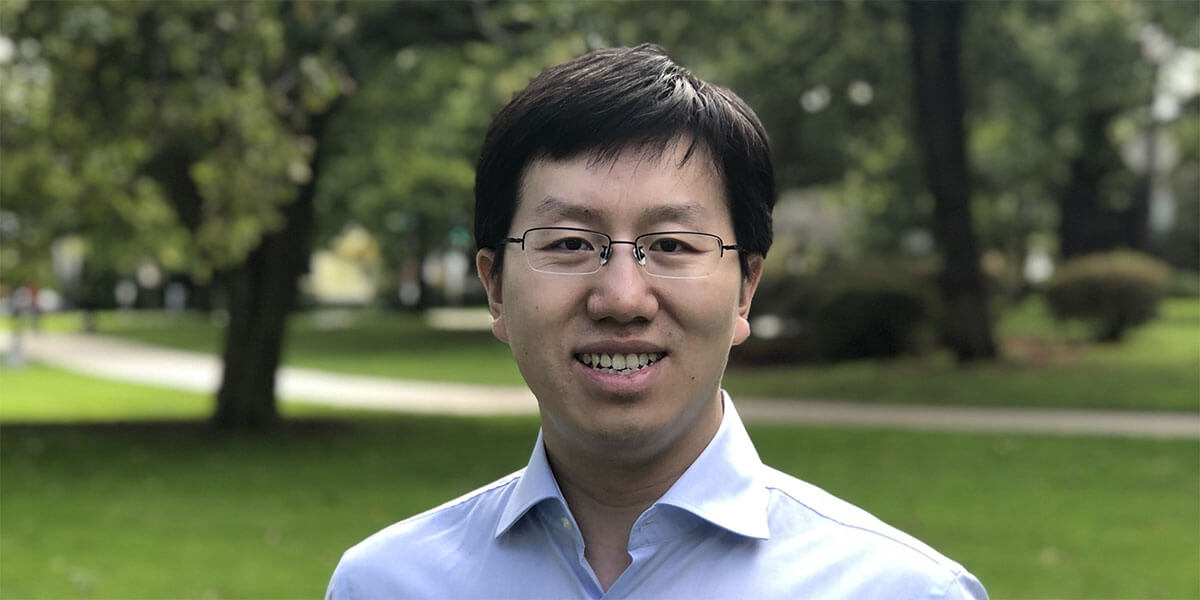
Hangbo Zhao, assistant professor of aerospace and mechanical engineering and biomedical engineering
Hangbo Zhao, an assistant professor of aerospace and mechanical engineering and biomedical engineering at the USC Viterbi School of Engineering, has been awarded a 2025 National Science Foundation (NSF) CAREER Award — one of the United States’ most prestigious early-career faculty honors.
The five-year, $546,713 award recognizes Zhao’s pioneering work in the science and technology of advanced manufacturing and will fund his project titled “High-Resolution Liquid Metal Patterning for Stretchable Electronics Through Self-Assembly and Transfer Printing.” His research focuses on developing a novel, scalable manufacturing method for precisely patterning liquid metals at microscale resolution. This method could enable high-performance stretchable electronic devices for use in biomedical engineering, wearable technology, and soft robotics.
Established by the NSF to support early-career faculty with the potential to lead in both research and education, the CAREER Award helps scholars build a firm foundation for a lifetime of leadership in integrating academic research and teaching.
Zhao, who joined USC in 2020, brings a wealth of experience in manufacturing and materials research. From 2017 to 2019 he worked as a postdoctoral fellow in the Center for Bio-Integrated Electronics at Northwestern University, and received his PhD and M S degrees in mechanical engineering at MIT in 2017 and 2014, respectively.
At USC, Zhao leads the Zhao Research Group, with focus areas including micro/nano manufacturing, bio-integrated electronics, and soft robotics. Advances in these areas will find applications in biomedical devices, human-machine interfaces, tissue engineering, among many others.
The NSF-funded project will target key challenges in the field of liquid metal-based stretchable electronics by developing a manufacturing approach that combines self-assembly and transfer printing. The goal is to achieve high-resolution, high-throughput patterning of liquid metals on soft substrates — an area that has been limited by current manufacturing techniques. Zhao’s work will explore the fundamental mechanics of this process, the process-structure-property relationships, and the demonstration of high-performance stretchable devices.
“There is a strong need to manipulate and pattern liquid metals for a wide variety of stretchable electronic devices,” said Zhao. “This project introduces a new approach that enables microscale patterning, high stretchability and compatibility with a wide range of soft substrates. It could transform how we manufacture soft electronics for biomedical applications, wearable sensors, and beyond.”
In addition to advancing fundamental science, the project includes an educational component designed to cultivate a new generation of scientists and engineers in electronics manufacturing. Zhao will lead several outreach initiatives aimed to provide hands-on experience in electronics and manufacturing to K-12 and high school students, sparking early interest in STEM and engineering careers.
“USC Viterbi, the Center for Advanced Manufacturing, and the AME department offer an exceptional environment for advancing soft electronics and manufacturing technologies,” Zhao said. “The combination of cutting-edge research facilities, strong ties to industry and a commitment to educational outreach makes this the ideal place to pursue transformative work in stretchable electronics.”
Published on July 30th, 2025
Last updated on November 17th, 2025







